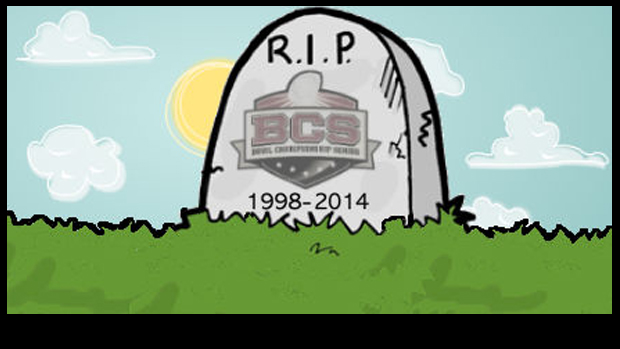
 This year, college football’s championship system gets a complete overhaul – or rather, a lazy makeover that hardly conceals much of what was in favor of what is.
This year, college football’s championship system gets a complete overhaul – or rather, a lazy makeover that hardly conceals much of what was in favor of what is.
Yes, instead of a BCS National Championship Game, an event that itself isn’t very old, the Football Bowl Subdivision’s national championship will be determined with the cleverly named College Football Playoff. Instead of simply taking the top two ranked teams in the country and having them face one another at the end of the season, this system will take four teams as chosen by a playoff committee, and have them play a series of single elimination games to determine who earns the national championship.
Think of it as a very, very, very exclusive March Madness.
Yes, the bowls will still be around, most of which will act as consolation prizes of sorts for those who aren’t in contention for the national title (which really isn’t far from what they have been up to this point). A choice few – the Rose, Cotton, Sugar, Orange, Fiesta, and “Atlanta” bowls – will rotate as host sites for the playoff games with the championship game up for bids to host cities and venues, similar to how the sites of the Super Bowl and Final Four are determined.
 The function of this new playoff system is, primarily, to make a stupid crazy amount of money and, secondarily, to avoid much of the controversy that mired the BCS. (Make no mistake though; this is mostly a cash grab.)
The function of this new playoff system is, primarily, to make a stupid crazy amount of money and, secondarily, to avoid much of the controversy that mired the BCS. (Make no mistake though; this is mostly a cash grab.)
The Bowl Championship Series, over the course of its 16-year run, was certainly a lot of fun. Most seasons, it provided college football fans with a pretty indisputable national champion, and served to legitimize every game of the regular season, something still not yet the case in pretty much every other sport played in these United States. It allowed for some of the nation’s most historic and long-celebrated bowl games to serve as hosts to these championship bouts. And it made a lot of money (have we mentioned the money yet?) for college football leagues and teams, not the least of which is our Southeastern Conference, which truly became the power it is today under the auspices of the BCS.
It was, however, a few light years away from perfect and routinely criticized for unfairly benefiting certain programs and conferences over others. For example, why was the Big East of the past five years or so allowed an automatic in to a BCS bowl, giving us such time-wasting blowouts as Oklahoma’s four-touchdown obliteration of Connecticut in the 2011 Fiesta Bowl. Or why, in 2010, were undefeated TCU and Boise State denied any sort of shot at the national championship? It’s not like either of them would have beaten Alabama that year anyway, so why were the Texas Longhorns seen as somehow a better opponent? Or, perhaps most notoriously, why did we have to suffer through watching USC embarrass Oklahoma in 2005, while a pretty damn good undefeated Auburn team was left to fend for themselves in the Sugar Bowl?
At the very least, this system doesn’t baselessly reward certain conferences over the other, nor does it only allow two teams to vie for the national championship. Ideally, this system will give legitimate shots to the four best college football teams in the country, as determined by a committee heavily leaning on conference championship games, polls, and “computers,” whatever those are.
So you’re already seeing where it could go wrong, right? What if there are maybe five or six teams that could be argued deserve a chance to shine in the College Football Playoff? What if it’s determined that this committee shows some sort of bias towards teams from a particular region, or succumbs to the desires of the television networks poised to make a lot of money (again with the damn money) off of these broadcasts?
Well, that’s fine if you ask me. That type of controversy can, really, only result in a complete overhaul of the system as we know it, or result in “tournament creep” whereby more teams are added to the already established tournament system. That’s a good thing for Ole Miss fans, because it gives our team an even more legitimate shot to take part in the national championship festivities.
And of course this system is bound to be criticized and flawed. What championship system isn’t? The NFL playoffs don’t incentivize teams to win every game they play. March Madness’ one-and-done scheme is so irrational as to lend credence to the very idea of it being “madness.” The English Premier League doesn’t even have a postseason of any sort.
So the College Football Playoff is a slight improvement, but it’s an improvement nonetheless, as well as one that greatly benefits the Ole Miss Rebels. It also serves to the improvement of the overall football fan experience because, lookit, more football! Nope, not everybody will be happy with it, but I can wager that college football fans (and their money) aren’t exactly going anywhere any time soon.
–
This article originally appeared in TLV #196 (published January 23, 2014). To download a PDF of this issue, click HERE.
To read more sports musings, visit RedCupRebellion.com


